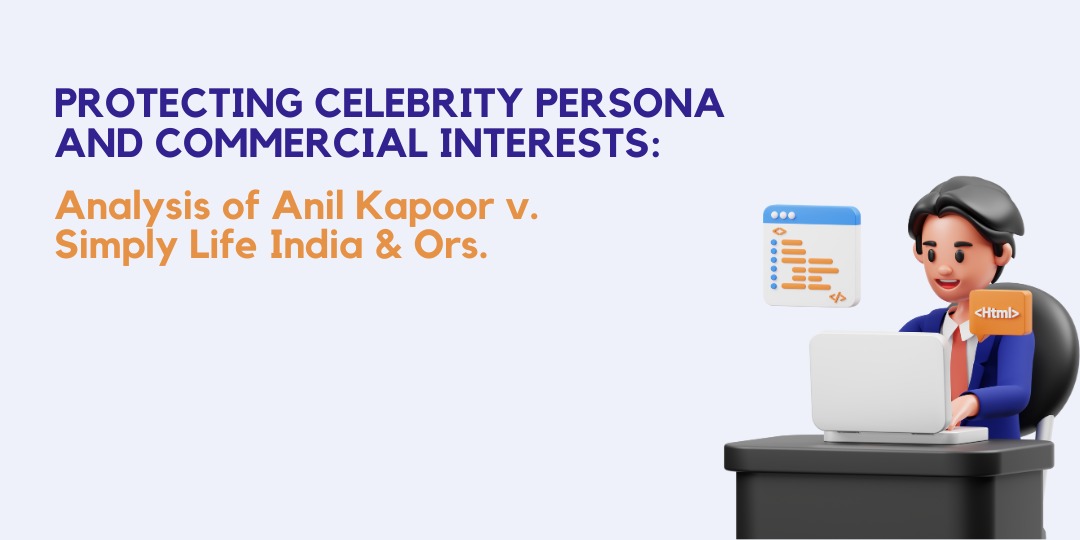Protecting Celebrity Persona and Commercial Interests: Analysis of Anil Kapoor v. Simply Life India & Ors.

Sonam Nanda – Advocate, Surana & Surana International Attorneys
INTRODUCTION
On September 20, 2023, the Delhi High Court delivered a significant order in the case of Anil Kapoor v. Simply Life India & Ors, ruling in favor of the widely known Indian actor, Anil Kapoor. The court issued an ex parte order in response to Suit CS COMM 645 of 2023, where Kapoor sought protection for various facets of his personality that amounted to certain commercial value. These included his name, voice, dialogue delivery, image likeness, gestures, signatures, and other elements, primarily concerning their misuse across the internet.
FACTS
The Plaintiff, Anil Kapoor, asserted multiple legal claims, encompassing personality rights, copyright protection for dialogues and associated works, as well as common law rights of passing off, dilution, and unfair competition. The plaintiff highlighted instances against each of the twenty-one Defendants involving the sale and use of his images and taglines for merchandising, creation of GIFs, and the use of generative Artificial Intelligence to create deep fakes where Anil Kapoor’s images were morphed into various Disney characters and actors like Katrine Kaif. Anil Kapoor contended that the defendants were exploiting various aspects of his persona for malicious and commercial purposes.
PLAINTIFF’S ARGUMENTS
Anil Kapoor’s central allegation was that the Defendants inappropriately utilized various features of his persona, thus causing harm to his reputation and interests. The Plaintiff’s placed reliance on the judgements given by foreign courts such as the judgement in the case of Bette Midler v. Ford Motor Company[1] which deliberated on the rights of celebrities and held that when a celebrity’s widely known and distinctive voice was intentionally replicated and imitated in order to sell a product, it will be it considered as a tort under the Copyright Act as the sellers appropriated what does not belong to them. The Plaintiff further placed reliance on Vanna White v. Samsung Electronics America[2] which deliberated on the issue of whether appropriation of a person’s identity without consent was an invasion of the right to privacy. The Court rejected the defence of piracy which is often invoked in such cases of violation of intellectual property and held that the law protects a celebrity’s right to exploit the value from her fame whichever way achieved and that the right of publicity was developed to protect the commercial interest of celebrities in their identities. The plaintiff’s reliance on foreign judgments underscored the international jurisprudential recognition of protecting celebrities’ rights in their identities.
The Plaintiff cited and placed reliance on the draft ‘Prevention and Regulation of Dark Patterns, 2023’ issued under Section 18 of the Consumer Protection Act, 2019 by the Ministry of Consumer Affairs, Government of India, which seeks to protect consumers against what is termed as “dark patterns”.[3] Dark Patterns have been referred to mean any practices or deceptive design patterns using UI/UX (user interface/user experience) interactions on any platform; designed to mislead or trick users to do something they originally did not intend or want to do; by subverting or impairing the consumer autonomy, decision making or choice; amounting to misleading advertisement or unfair trade practice or violation of consumer rights. The Plaintiff claimed that the use of generative artificial intelligence to create deep fakes of Anil Kapoor and creation of websites under the name of Anil Kapoor misleads the consumers and amounts to unfair trade practices.
ORDER
Justice Prathiba M. Singh carefully considered the arguments of the Plaintiff and noted the absence of Respondents to pass an ex-parte order, where she underscored the delicate balance between a celebrity’s fame and the protection of their individual rights. The Hon’ble Justice observed that fame could bring about certain disadvantages, including the erosion of personal rights such as the right to livelihood, privacy, and dignity within a societal framework. While acknowledging the importance of free speech, she clarified that when the exercise of this right crossed a certain threshold and resulted in harm to an individual’s personality or associated attributes, it would constitute an illegal act. Relying on the judgement of the Supreme Court in the case of R. Rajagopal v. State of Tamil Nadu (Auto Shankar case), Justice M. Singh stated that the Court cannot turn a blind eye to such misuse of a personality’s name and other elements of his persona and that Dilution, tarnishment, blurring are all actionable torts which the Plaintiff would have to be protected against. It was held that creation of merchandise, GIFs and ringtones for commercial purpose and the domain names using the term Anil Kapoor can not be allowed. Justice Prathiba M. Singh further emphasized the significance of a celebrity’s right to endorse products and how this could be a vital source of their livelihood. She pointed out that such rights should not be obliterated by permitting the unlawful dissemination and sale of merchandise featuring the celebrity’s likeness, face, or associated attributes, including items like t-shirts, magnets, key chains, cups, stickers, and masks.
CONCLUSION
In conclusion, the judgment in Anil Kapoor v. Simply Life India & Ors sets a significant precedent in the realm of protecting celebrity persona and related commercial interests. It serves as a reminder that the right to free speech, while essential, must be exercised responsibly, especially when it infringes upon the individual rights and commercial interests of well-known public figures. This case underscores the imperative of striking a balance between the right to information, news, satire, and criticism, and safeguarding the integrity and commercial value of a celebrity’s persona in the digital age. As stated by justice M. Singh, the present case shows how elements of intellectual property that protect the attributes of an individual, in fact have other dimensions including rights protected by the Constitution of India.
[1] Bette Midler v. Ford Motor Company 849 F.2d 460, 1988.
[2] Vanna White v. Samsung Electronics America 971 F.2d 1395, 1992.
[3] Prevention and Regulation of Dark Patterns, 2023.



